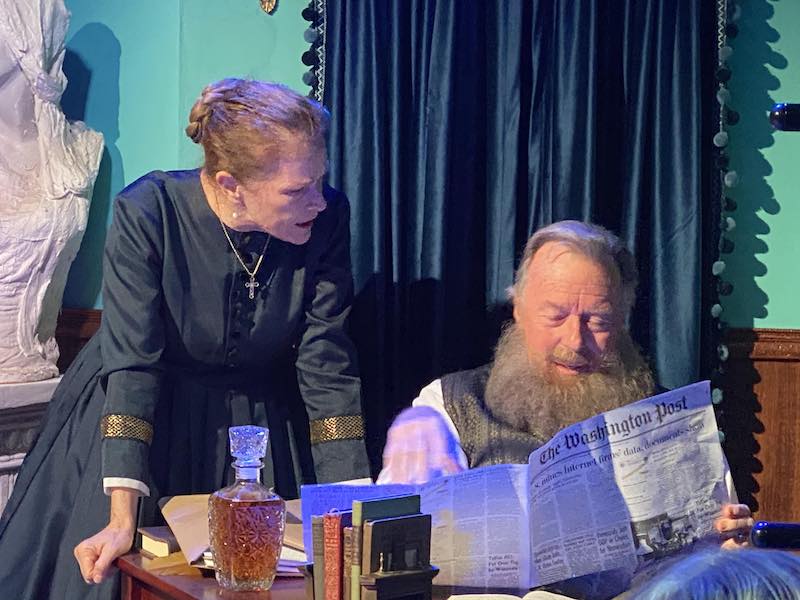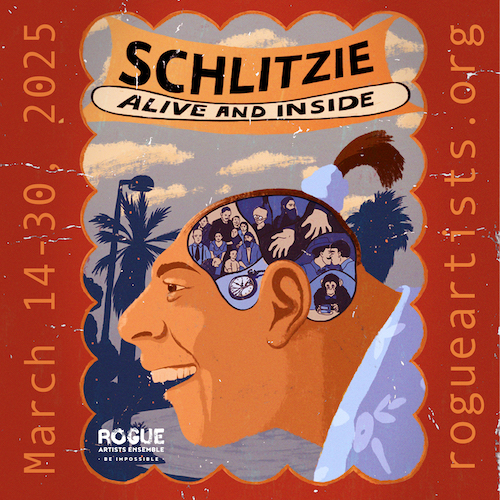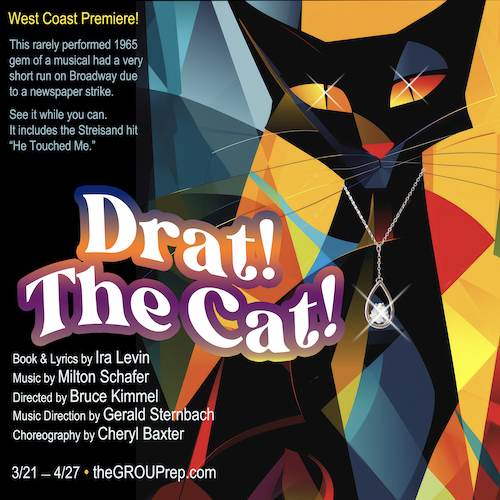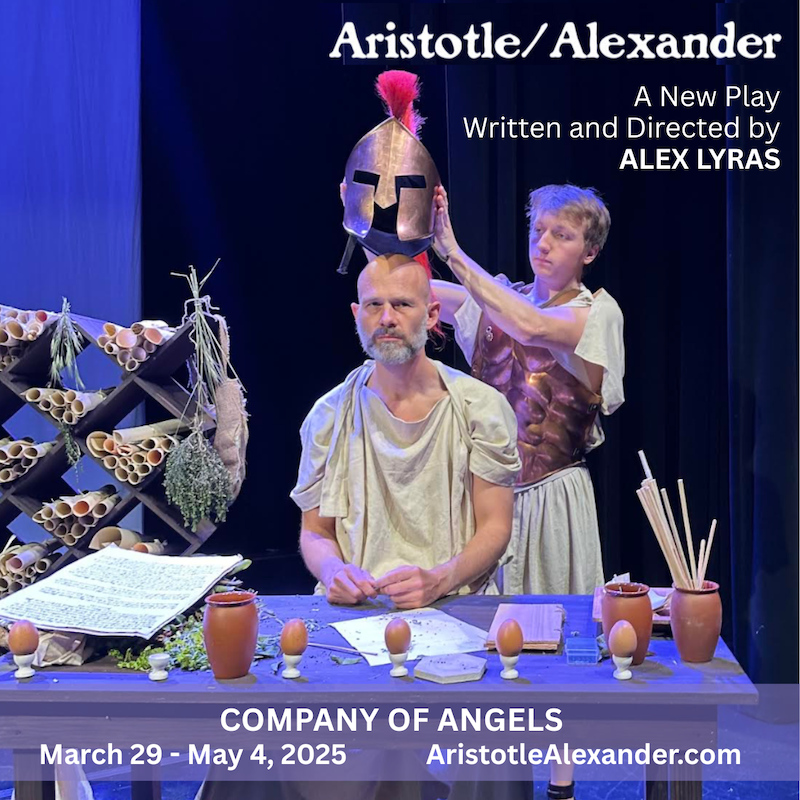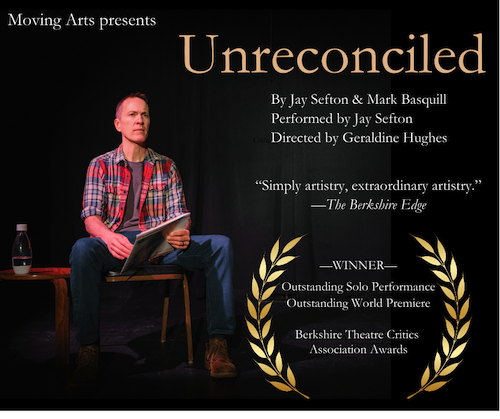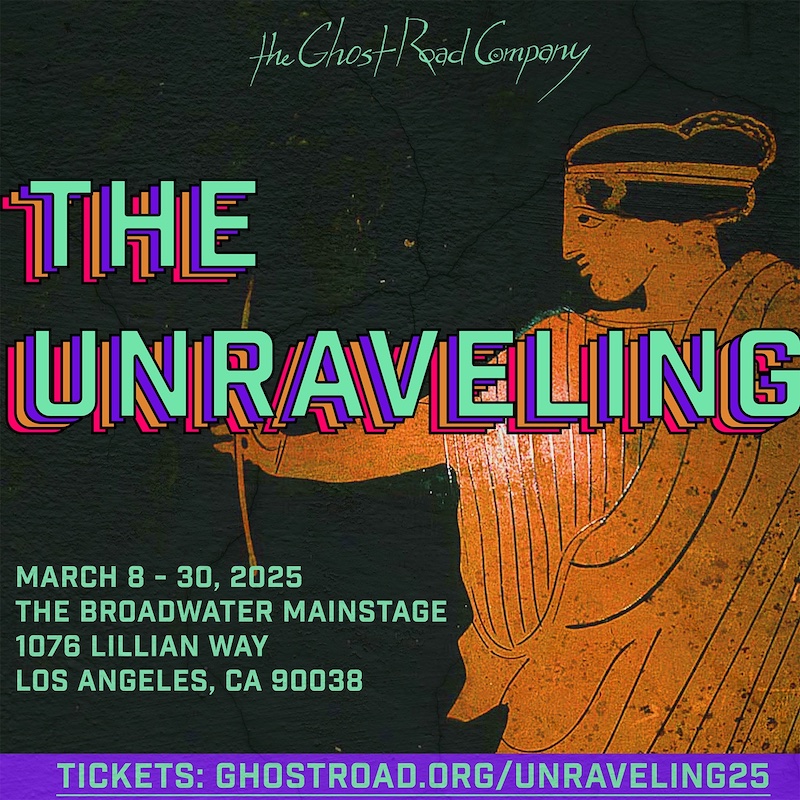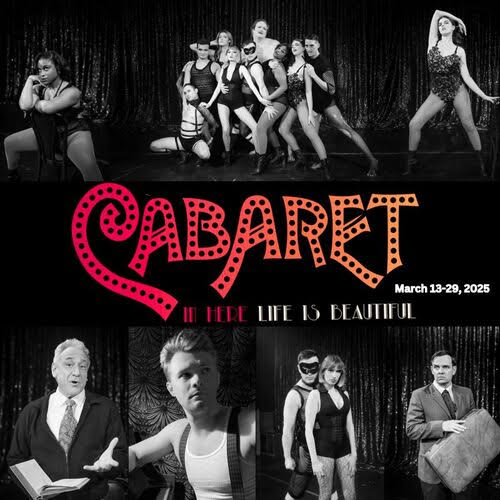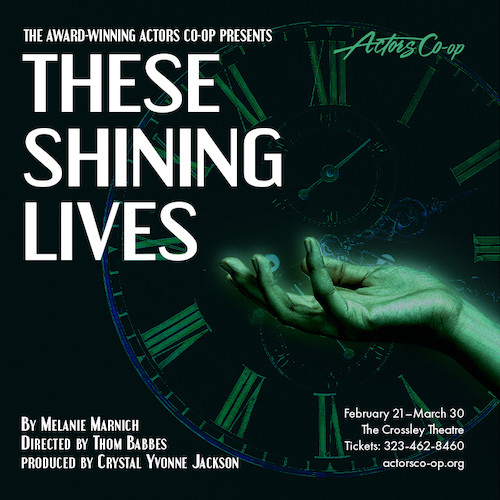
Jenny Buchanan and Kelly Franett (Photo courtesy of Ophelia’s Jump)
Reviewed by Steven Leigh Morris
Ophelia’s Jump
Through Dec. 10
Jean Collinsworth’s fantastical and fastidiously researched biodrama about Herman Melville is out of the frying pan at Ophelia’s Jump in Upland. It could use a bit more tossing around in the skillet, and the added attention would be worth the effort, given the rich palette of ideas contained in this play.
Let’s start with the ideas, since these are the play’s most attractive assets: We have Herman Melville, one of America’s founding writers of fiction, along with Nathaniel Hawthorne, whose portrait hangs over the mantle of director/scenic-designer Beatrice Casagrán’s realistic New York living room set.
Collinsworth has no designs to romanticize Melville. Rather, in conjunction with Kelly Franett’s convincing depiction, the author of Moby Dick emerges with the qualities of a tyrant and a pedant, yet a character fully cognizant of his personal and professional failings. “Failings” is overly harsh, given how the man is now a legend of American literature. Yet, during his lifetime, Moby Dick went quickly out of print (that’s mentioned in the play): the response of American critics and the domestic reading public was largely apathetic. It was the British who rose to the book’s defense and rendered it a masterpiece. Melville never lived to see that glory, which is partly why he struggled to justify his purpose. His writings alone could not sustain his family financially, and yet he was obsessed with words and metaphors and metaphysics and mythology, ancient and modern. Writing was his calling, and almost nobody was calling back.
That obsession, twisted into torment, led him to swill too much brandy, and to disregard his attention-craving son Malcolm (David Duarte Guzman) who, shortly after joining the National Guard (largely to impress his dad), planted a bullet in his own head at the age of 18. In the play, Melville grudgingly admits to having once, under the influence of brandy, knocked his longsuffering wife Lizzie (Jenny Buchanan) down a flight of stairs, rendering his relations with his daughter Bessie (Sophia Levi) similarly fraught. Bessie is encumbered physically by a pair of splints attached to two fingers on each hand: a treatment for stress-related arthritis. Two other children left home, allegedly to flee the patriarch’s tyranny.
Children: Don’t let your parents grow up to be writers.
Much of this gets discussed at the play’s start in a spirited tone under Casagrán’s direction. There’s also the matter of the Irish maid (Allison Meister), who, in the midst of being courted by ne-r-do-well Malcolm, harshly jilts him for her second-cousin, newly arrived from County Mayo.
The second half of Act 1 is Melville’s fever-dream. Nobody is coming for dinner or drinks — invitations declined last minute. And so the writer hosts a cocktail party for a gallery of historically notable phantom-acquaintances who enter as though walking through the walls, while swilling empty brandy glasses (Melville’s is filled), and having what’s probably a tooamiable discussion of issues that continue to resonate in the United States: race relations, treason by elected officials and colonialization (in this instance of Native American tribes.)
The scene recalls Caryl Churchill’s Top Girls, but without the unifying concept of, say, powerful women. The guests include lawyer Richard Henry Dana (Jeff Sable); Black de-segregation attorney and activist Robert Morris (Ralph Merant); tribal chief Manetga Te Hiko (Edgardo Flores), who inspired the character of Moby Dick’s harponeer Queequeg; and the highlight guest, lecturer Olive Fairchild (Stacey Patiño), a White woman in the Oatman family captured as a child and enslaved for four years by what were probably the Yavahai Tribe in the Mojave Desert, after they’d literally clubbed most of her pioneer family to death. (Colonialism and its blowback.) After her eventual release, negotiated by the U.S. Government, she bore tribal tattoos on her face and chin while lecturing about her teenage experiences. Here, those tattoos are strikingly rendered by makeup designer Mia Valdez, supplementing Patiño’s chirpy if not jubilant performance.
All of this raises the question of this extended fantasia’s dramaturgy. The cocktail party looks perfectly plausible, with Casagrán’s gorgeous costumes and plenty of energy on the stage. Still it’s an extended scene of stories and repartee, and roaring laughter at anecdotes, which we in the audience are newly privy to. While this history lesson is theatrically vibrant, it’s also dramatically inert. We do hear a single gunshot fired in a back room, which none of the guests hear. Nor, more notably, does Herman Melville. His son just shot himself, and he’s lost inside his own head. That’s the point, of course, but it takes a long time to get there.
Things pick up notably after intermission with the recriminations over the suicide, and Melville’s determination to keep it under wraps. Here, Buchanan, as Melville’s wife, hits her stride with blazing stoicism and intelligence — anger that never descends into petulance, and a religiosity that steers clear of sanctimony. We then jump forward two decades, to the immediate aftermath of Melville’s death, which doesn’t prevent him from hanging around the room, observing — a nice touch. The final scene also reveals how his guilt over his son’s death influenced the writing of Billy Budd.
I suspect that the family drama needs distilling, so that it’s more connected to the fantasia, or vice versa. Or, perhaps, the separation of the real and the fantastical needs to be more distinct, perhaps entirely separated, which could be scintillating, so that these two different plays are part of a more deliberate conceit.
On the heels of Kelly McBurnette-Andronicos’s The House of Final Ruin (2022), Sealed Orders is another example of this theater taking a risk on a new play focused on little-known chapters of American history. The value of such artistic bravery can’t be underestimated.
Ophelia’s Jump, 2009 Porterfield Way, Suite H, Upland. Fri.-Sat., 8 pm; Sun., 4 pm; Thurs., 7:30 pm; dark Fri., Dec. 8; thru Dec. 10. https://opheliasjump.org Running time: Two hours and 15 minutes, including intermission.


